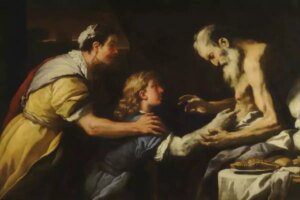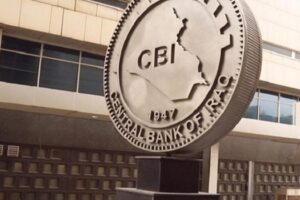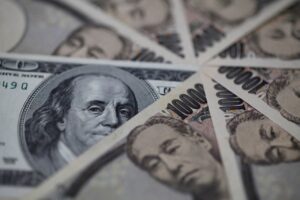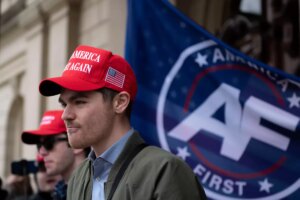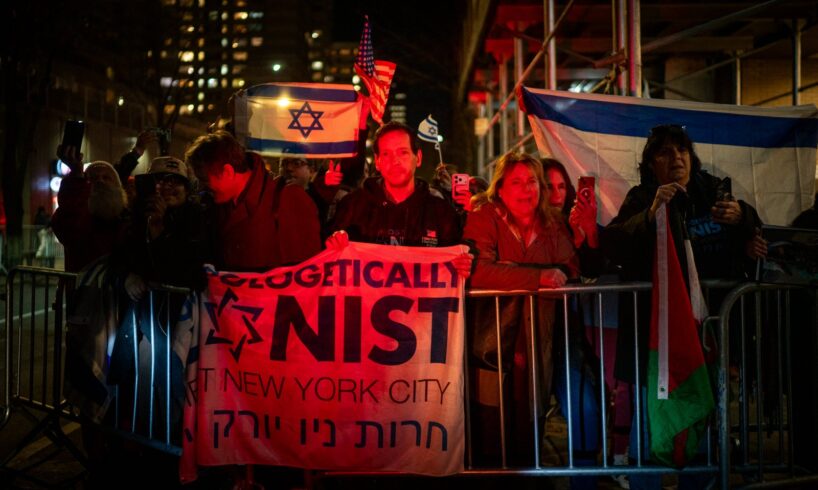
In June 2024, protesters in Los Angeles targeted a synagogue hosting an Israel real estate event, accusing organizers of “stealing Palestinian land.”
Around 200 demonstrators gathered outside the event, at the Adas Torah synagogue in the Pico-Robertson neighborhood.
Scuffles broke out, and demonstrators allegedly threw punches at synagogue members, chanted for an intifada, used a skateboard as a weapon and wielded bear spray.
The protest also allegedly prevented worshipers from accessing afternoon prayers at the synagogue, prompting a federal complaint against the organizers based on the novel use of a law meant to protect abortion clinics.
The issue of synagogue protests surfaced again this week after a caustic demonstration outside a New York City synagogue that has alarmed the city’s Jews and prompted questions about a response. Jewish community legal advocates believe that the abortion law could provide one such response.
Get The Times of Israel’s Daily Edition
by email and never miss our top stories
By signing up, you agree to the terms
Blocking access to houses of worship is illegal under the Freedom of Access to Clinic Entrances (FACE) Act. Lawmakers enacted the measure in 1994 to protect the entrances to abortion clinics, but the text of the law also applies to “a place of religious worship.”
The law makes it illegal to injure or interfere with people who are seeking to exercise their First Amendment right to religious freedom at a place of worship. Interference includes deploying force, threats of force, or physical obstruction, the law says.
Lawyers filed a lawsuit under the FACE Act against the organizers of the Los Angeles protest, the first time the law had been used in such a context, said Mark Goldfeder of the National Jewish Advocacy Center legal group, one of the lawyers on the case.
The entrance to Park East Synagogue, with dueling protesters on each side, separated by police, in New York City, November 19, 2025. (Luke Tress/Times of Israel)
“Synagogues, and events held within them that are tied to Jewish religious education, observance, or communal religious life, fall squarely within this protection,” Goldfeder said Friday of the FACE Act.
Federal law takes a broad view of religious exercise, covering prayer services, Torah study, religious lectures, communal learning, lifecycle events, and events connected to religious commandments or observance, Goldfeder said. The FACE Act protects the free entry and exit into buildings for those activities.
The Los Angeles lawsuit said the FACE Act applied because the protesters had prevented worshipers from entering the synagogue for their daily minyan, a Jewish prayer session, and Torah study sessions. The lawsuit also argued that the Israel real estate event was connected to Jewish religious observance because many Jews believe the faith includes a religious commandment to move to Israel.
The defendants in the Los Angeles case are the activist groups Code Pink and the Palestinian Youth Movement, and WESPAC, a New York nonprofit that has handled finances for an array of anti-Israel activist organizations, including the Palestinian Youth Movement.
Anti-Zionist protesters outside a New York City synagogue, November 19, 2025. (Luke Tress/Times of Israel)
The US Department of Justice filed a statement of interest supporting the plaintiffs in the case in March.
In a second case, in September, the US Department of Justice sued anti-Zionist protesters under the FACE Act, accusing them of intimidating Jewish worshipers at a New Jersey synagogue.
The lawsuit, filed in a federal court in New Jersey, alleged that a November 2024 protest against a synagogue in West Orange, New Jersey, escalated into violence. That protest also targeted an Israel real estate fair. (The synagogues do not organize the events themselves; organizers rent out space in the buildings.)
“The practice of turning a blind eye to these attacks on houses of worship throughout the United States stops now,” Harmeet Dhillon, the head of the Justice Department’s Civil Rights Division, said at the time.
The civil lawsuit in New Jersey names the Party for Socialism and Liberation in New Jersey and Muslims for Palestine New Jersey as defendants.
Los Angeles Police Department (LAPD) officers clash with anti-Israel protesters gathered outside the Adas Torah Orthodox Jewish synagogue in Los Angeles, June 23, 2024. (Photo by David Swanson/AFP)
In the New York protest on Wednesday night, demonstrators gathered next to the building’s entrance, chanting threatening and violent slogans, and hurling discriminatory slurs at Jews.
Unlike the New Jersey and Los Angeles protests, though, the New York rally did not feature any violence or physical obstruction of the synagogue’s entrance.
Without physical obstruction or violence, even intimidating and racist rhetoric outside a synagogue, no matter how ugly or upsetting, is likely protected speech, said Aaron Terr, the director of public advocacy at the Foundation for Individual Rights and Expression (FIRE), a free speech advocacy group.
The First Amendment protects both the right to free speech and the right to religious worship, but only refers to the government’s inability to limit those rights. Employers can still fire workers for speech, for example.
There are no exceptions for protesting near a house of worship, although the government can place reasonable, narrow restrictions on protests to maintain government interests, such as protecting religious worship or public safety. The restrictions cannot limit speech more than is necessary, Terr said.
“Intimidation in the legal sense of the word is a form of a true threat,” he said. True threats and incitement require actual intent to harm someone, or place them in fear of bodily injury, and are not protected speech. Chanting “Death to the IDF,” one of the chants at the New York protest, is not a targeted threat toward an individual, he said.
Racist slurs are protected, unless they cross the line into harassment, for example, if someone follows another person around assailing them with discriminatory remarks. Terr pointed out that the Supreme Court has upheld the right of the Westboro Baptist Church to harass mourners with discriminatory rhetoric at funerals.
“We don’t want government officials making subjective and politically biased judgments about what speech and viewpoints are acceptable. That’s why the bar is set so high,” Terr said.
Goldfeder argued that the FACE Act does not require any physical injury, saying, “Intimidation or obstruction alone is sufficient.”
Both the New Jersey and Los Angeles lawsuits, the first test of the FACE Act for synagogue protests, are still making their way through the courts.
The New York protest shared other similarities with the incidents in New Jersey and Los Angeles. The New York demonstration also targeted an event related to Jews moving to Israel and was organized by anti-Zionist activist groups.
And, like the previous incidents, the Department of Justice has taken an interest, and appears to have the FACE Act in mind.
“It’s a federal crime to block access to a house of worship in the US,” Dhillon said. “We are gathering information about this incident.”

